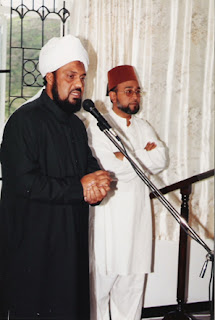Spiritual history is replete with deep and profound
ironies. Whenever Allah the Most High raises a
Messenger of His, leaders of the society will reject him. The elite of the
community will vehemently oppose him. Only a very few, relatively
materially-poor and humble in spirit, will accept the Divine Messenger. This
small band of believers will go on to undertake extraordinary sacrifices in
pursuit of their deeply held convictions. They will display nobility of
character against all odds and in the face of adversities, eventually to emerge
as the shining stars in the darkest of skies.
Jamaat Ul Sahih Al Islam of Kerala today
straddles this path of sublime spirituality. In spite of their small numbers, modest
economic conditions and adverse social circumstances, members of the Jamaat in
Kerala compete among themselves in the spirit of financial sacrifice and to
show perfect obedience to the words and wishes of the Messenger of Allah. In
his Friday Sermon of 30 March 2012 and also
on April 06, 2012 Khalifatullah Hadhrat Munir Ahmad
Azim Sahib of Mauritius (atba) took note of the spirit of sacrifice and
obedience being displayed by the Kerala Jamaat.
Extracts from the
Sermons:
Before ending
my sermon, I wish to address all my brothers, sisters and children in Kerala.
First of all, Assalamoualaikum
Warahmatullah Wabarakaatuhu (May the peace, grace and blessings of
Allah be upon you). It is my humble prayer that Allah keeps you in good
physical and spiritual health always, give you long life and increase your
wealth, Insha-Allah.
The Jamaat Ul Sahih Al Islam of Kerala has made
extraordinary efforts in the field of financial sacrifice, only for the
pleasure of Allah in the 72 hours which has just went by. From among the existing Jamaats in several
countries, the Jamaat of Kerala has excellently done “Fastabikul Khairaat” (vying each other in good deeds). By
their deeds, they are reviving Alhamdulillah the great sacrifices of the Sahaba
Karaam in the times of the Holy Prophet Muhammad (peace be upon him). Despite their meagre financial positions,
the Sahaba Karaam used to go and work in the market only to receive some money
to put in the hands of the Messenger of Allah (peace be upon him) to spend in
the path of Allah. They have done this with joy in their hearts despite not
having any food at home or adequate clothing. For them, Allah and His Messenger
(peace be upon him) came first. Their sacrifices were such that Allah the
Almighty blessed them and this blessing made them reached the peak of glory
today, spiritually speaking.
With the advent
of this humble self, the humble servant of Allah in this era, whereby Allah has
raised me with a Jamaat, Jamaat Ul Sahih Al Islam, that beautiful spirit of
sacrifice shown by the Sahaba Karaam has been awaken today in Kerala despite
their difficult financial situations. Nevertheless they did not hesitate to say
“Labbaik” to the Khalifatullah of this era.









